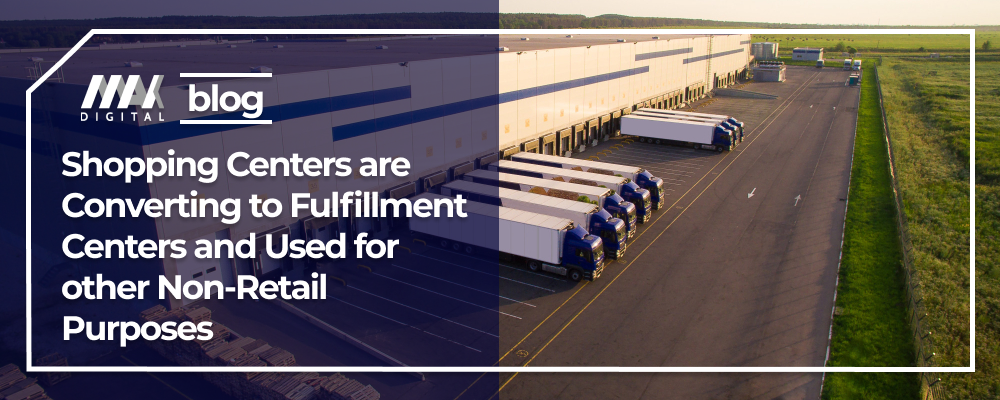
In the last few years, retail has suffered a downturn in foot traffic, resulting in lower sales. This is due to the boom of the eCommerce industry. In 2020, coronavirus restrictions are responsible for further reducing foot traffic by 27% in comparison to the previous year. Owners of shopping centers are suffering large losses from this, in some cases, causing them to file for bankruptcy. Washington Prime Group a real estate investment trust that invests in shopping centers, and has over 100 locations across the US, recently filed for Chapter 11 bankruptcy. In response to the new fate of retail in the last few years, owners have started converting shopping centers into fulfillments centers and leasing spaces out for non-retail use.
The eCommerce industry does not appear to be slowing down anytime soon. In fact, according to eMarketer, the industry is expected to grow by 18% in 2021, therefore, shopping centers may continue to see reduced foot traffic. One of the best methods for owners to benefit from the growth of eCommerce is by providing a service that is sought after in the eCommerce industry.
What Value can Shopping Centers Offer the eCommerce Industry?
A CBRE analysis shows that the shift in shopping centers from retail purposes to industrial purposes increased in 2017. Shopping center owners launched 60 projects that will turn 14 million sq. feet of retail space into industrial space of about 15 million sq. feet. Compared to the 94 retail-to-industrial projects from the entire previous decade, the conversion of retail spaces into industrial use has clearly increased in this decade. Indicating this kind of transformation is becoming an ongoing trend.
Order Fulfillment
A product’s journey from a warehouse to the doorstep of the end-customer is termed as the last mile delivery. Shopping centers could be utilized for last-mile deliveries, and it is expected to reduce the cost of parcel shipments. Household delivery companies such as FedEx, DHL, or Amazon, have started seeing the potential of turning shopping centers into distribution hubs. Specifically for these last-mile deliveries. According to research by Coresight, Amazon has converted 25 shopping center spaces into distribution centers. Simon Property Group, who own more than 200 shopping centers, are also reportedly trying to partner with Amazon to convert some of their shopping center spaces into mini-fulfillment hubs for the marketplace.
Other traditional retailers such as Costco and Target are following suit and are converting large shopping center spaces to use for online order fulfilments. The partnerships between eCommerce companies, traditional retailers, and shopping center owners are strategic. Many of these retailers and eCommerce companies are partnering with shopping centers that are in locations where they have little market penetration or face supply chain challenges. They use the converted shopping centers as gateways to reach new markets and resolve their supply constraints in places where there is limited land available or where there are building restrictions.
Omnichannel Retailing
In the next three to five years, the US will continue to see a shift in the use of shopping centers from strictly onsite retailing to multi-purpose applications. Not only will eCommerce benefit from this shift, but the consumers and the communities surrounding these shopping centers will greatly benefit.
However, we should expect some shopping centers not to lease out all the available spaces. Instead, some spaces will be kept for traditional retail use. A change in consumer behavior in the last few years reveals that consumers desire a hybrid shopping option. Consumers want omnichannel retailing where they can use multiple channels to carry out one transaction; start the process online and finish offline or start offline and finish online.
Currently there is, BOPIS; Buy Online Pick up In-Store, BORIS; Buy Online Return In-Store, and SFS; Ship from Store. These are some of the omnichannel retailing options that are gaining momentum among consumers and retailers alike. At this point in time online shopping with home delivery is the most popular, but the BOPIS option is on the rise. It would benefit shopping centers to offer the eCommerce industry space for practicing omnichannel retailing.
The showroom model is another omnichannel retailing option where customers visit the store to see the product on display but buy online. In this case, instead of buying the product onsite, customers buy the product online and get home delivery. Warby Parker is an example of the showroom model. The eyeglass retailer is known for having no inventory in-store, instead, it lets customers see the product, buy online, and ships their orders to their homes.
Can Shopping Centers Benefit from This New Shift?
Yes, omnichannel retailing is potentially the boost shopping centers need right now in order to see growth in their sales. Consumers who choose the BOPIS or BORIS options will be visiting the store to pick up or return their order, in the process, they can end up shopping at other retailers within the area. Omnichannel retailing offers the advantage of cross-selling due to the impulsive buying habits of consumers visiting shopping centers.
Companies have always partnered to benefit from cross-selling. A perfect example of one of these partnerships is Kohls and Amazon; Kohls offers a department space as a return center for Amazon packages. Kohls profits from renting their department space while gaining the foot-traffic from Amazon customers, and Amazon makes the return process easy for its customers, a win-win scenario for both partners.
Bottom Line
The world has witnessed a lot of change since the coronavirus pandemic. Many of the worlds industries have gone through major changes to adapt to the ever changing markets. Shopping centers and eCommerce are no different, forced to adapt or risk failure. This trend of shopping centers converting to fulfillment centers will not slow, the only question is, what adaptation will come next?





